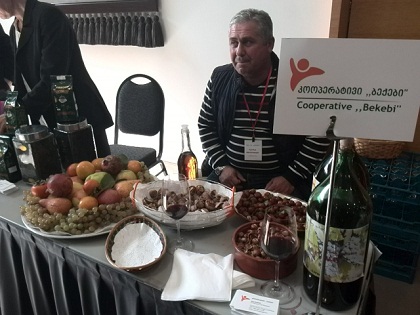Georgian Agriculture Cooperatives post successful 2014


Georgian farming, ranches and fishery cooperatives have a total 5 million GEL capital since March 2013when Georgian farmers where encouraged to organise into viable producer groups like - Agriculture Cooperatives.
Looking back at the challenges during that period, the Government said the key concern has been to stimulate peasants and farmers to unite in cooperatives with the aim of growing their crops and commercialising the agriculture sector.
The Agriculture Cooperatives Development Agency (ACDA), which was in charge of granting and terminating the status of individual cooperatives and monitoring their activities, believed these attempts resulted in approving 264 agricultural cooperatives.

"In 2014, totally more farms, ranches and fisheries are united in agricultural cooperatives,” head of the ACDA Giorgi Misheladze said at a presentation on October 16, as he summed up the achievements of Georgian agriculture cooperatives from March 2013 to October 2014.
Georgia’s Minister of Agriculture Otar Danelia believed entering into a cooperativewasan advantage that would help a person gradually develop their business and be oriented on the quality of the products.
"If you plan to produce low quality products it would be better if you don’t produce at all. We must have high quality products that will be compatible on the international market, including European and local markets.”
"Georgia is not the Soviet Union [and] have different products, one for local consumption and another for export.”
Of the 264 approved cooperatives, 106 were located in the eastern part of the country while the rest were situated in western Georgia. One was located in in the capital city Tbilisi.
The presentation, held at Expo Georgia exhibition hall in Tbilisi, was attended by high officials from the Government, representatives of international organisations andthe private sector, including deputy head of the European Union (EU)delegation to Georgia Boris Iarochevitch.
In his welcoming speech Iarochevitchsaid the EY was very proud of its contribution to Georgia’s success andthe extremely positive path of agriculture cooperative development which was taking place in Georgia.
"For many years, when almost no one else was actually paying that much attention to this subject, we promoted a deep policy dialogue with the Government, the Parliament, civil society organisations and all the relevant stakeholders on the potential role that cooperatives could play to modernise small farming in Georgia,” he said.
Through the European Neighbourhood Programme for Agriculture and Rural Development (ENPARD), the EU contributed €52 million to Georgia’s agricultural sector, with a very strong emphasis to cooperatives development.
Iarochevitch highlighted the experience of the European agriculture that a large proportion of farmers in most European countries were small farmers. Of these people, the majority of which (who were also medium and large-sized farmers too) were members of cooperatives.

In total, there were nine million agriculture cooperatives members across the EU, which meanttwo thirds of farmers was a member of at least one cooperative.
Furthermore, cooperatives represented over 60 percent of shares of the collection, processing and marketing of agricultural products. The total turnover of the European agriculture cooperatives was around €260 billion.
"Some of the biggest cooperatives in Europe have turnovers which are three or four times the total budget of the Ministry of Agriculture of Georgia,” Iarochevitch said.
Official figures claimed the total budget of Georgia in 2015 will be 9.4 billion GEL. In the agricultural sector, the Government expected to spend 291 million GEL next year.
While speaking of the future plans of the ADCA,Misheladze said the agency planned to open "cooperative markets” where products only produced in agriculture cooperatives would be sold.
The ADCA also expectedto create an information bank where a raft of information and materials about the cooperative development,and other information relating to the sale of products, will begathered.
 Tweet
Tweet  Share
Share